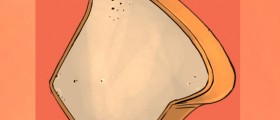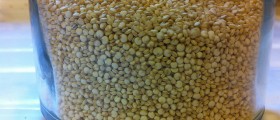
Celiac disease is an autoimmune disorder of the small intestine which usually develops in predisposed people of all ages. It is caused by a reaction to gluten, a protein found in wheat and similar proteins from the crops such as barley and rye. People with celiac disease have decreased absorption of nutrients from the food they eat which causes vitamin deficiency and affect the brain, nervous system, bones, liver and other vital organs. This consequently leads to other diseases, some of which are life-threatening.
Symptoms
Celiac disease has no set or typical signs and symptoms. People usually complain of the general things such as frequent diarrhea, bloating and pain in the abdomen. There are cases where people with celiac disease have no symptoms at all, or their symptoms look very much like the symptoms of other conditions. It is also possible that people become anemic, depressed or anxious, have muscle cramps, joint pain, skin rash, disorders with bones or teeth. Results of malnutrition usually include weight loss, diarrhea, cramps in the stomach and bloating, fatigue, anemia, and osteoporosis. If a person sees signs or symptoms similar to these, they should see a doctor. The risk of having celiac disease is greater if there are cases of it in the family. If a parents notices his child is pale, nervous, that his or her growth is slow, they should test the child for celiac disease.
Causes
The exact cause of celiac disease is not yet determined, but it is known that the condition is hereditary. People who have this disease do not have villi, tiny hairlike projections that line the walls of small intestine and whose function is to absorb nutrients, primarily vitamins and minerals from the food. If a person does not have villi, the body is unable to absorb the nutrients and they all get out of the body through the person's stool. There have been recorded cases when a person developed celiac disease after some sort of trauma, for example infection, physical injury, the stress after pregnancy or other serious surgery.
Treatments and drugs
There is no cure for celiac disease, however it can be managed through a proper diet. If gluten is avoided, inflammation of the small intestine will disappear after several weeks, and a person will feel better only a couple of days into a new diet. If a person has been malnourished for a prolonged period, the doctor will recommend taking vitamin supplements. Complete recovery may take several months to several years. Food that contains gluten includes all types of wheat, barley, bulgur, rye, matzo meal, triticale and spelt. There are also kinds of cereals like oat that are grown without gluten, but are contaminated with it during processing, so it is very important to read the labels on products. Other kinds of food to be avoided are breads, cookies, cakes, pies, pasta, sauces, cereals, and crackers. However, there are many kinds of food that are gluten-free such as rice, vegetables, fruit, rice, soy, corn wheat and most dairy products.

















Your thoughts on this
Loading...